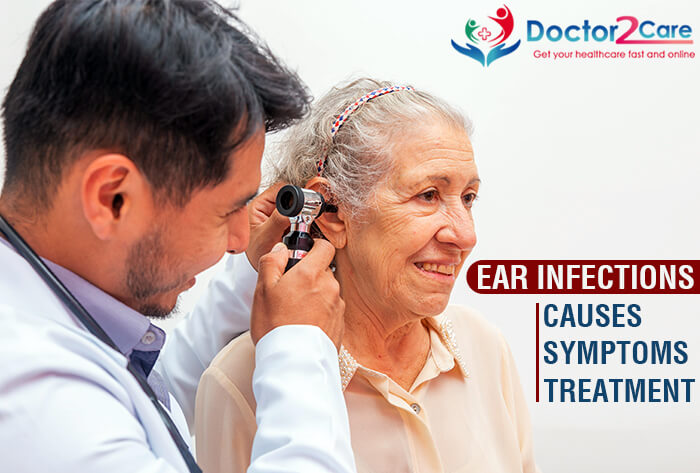Ear Infections - Causes, Symptoms, and Treatment

If you work with children, you're probably aware of how frequently kids have earaches. Adults get them, too, but children get them far more frequently. This is due to their inability to combat viruses and germs, as well as the fact that their tiny ears aren't yet capable of emptying fluids.
Along with an earache, you or your kid may have a sore throat, stuffy nose, or fever. These are symptoms of an infection.
Make an appointment with your doctor to find out for sure what's wrong. If it's an infection, she'll be able to advise you on the best course of action.
Causes and Symptoms
Any symptoms you've had will be brought up by your doctor. Bring any notes you may require and any queries you may have to the office.
The doctor uses an otoscope to examine the eardrum for symptoms of infection. If your child has an earache, this is a difficult process with a fussy newborn, so be prepared to assist the tiny one.
A crimson eardrum or a bulging eardrum with fluid behind it are both signs of infection. The fluid might be light, as with a cold, or thick, as with pus. It's in the center of the ear, directly behind the eardrum. The term "otitis medium" refers to a condition in which the middle ear is inflamed. An otoscope with a puffer attached blasts air to examine whether your thin eardrum moves. The eardrum becomes more stiff and does not move back and forth when there is fluid in the middle ear.
The doctor might also use another device to examine for symptoms of infection. A tympanometer is a device that combines sound and air pressure to detect fluid in the middle ear.
Risk Factors
- Age. Because of the size and structure of their eustachian tubes, as well as the fact that their immune systems are still developing, children between the ages of 6 months and 2 years are more susceptible to ear infections.
- Child care in a group setting. Children who are cared for in groups are more likely to catch colds and ear infections than children who are cared for at home. Children in group settings are more susceptible to diseases like the common cold.
- Feeding a baby. Babies who drink from a bottle, particularly when lying down, are more likely to get ear infections than those who are breastfed.
- Seasonal influences. The fall and winter seasons are the most typical times for ear infections. When pollen levels are high, those with seasonal allergies may be more susceptible to ear infections.
Complications
Some complications related to Ear Infections are:
- Hearing impairment. With an ear infection, little hearing loss is pretty normal, although it generally improves once the infection is cleared. Repeated ear infections, as well as fluid in the middle ear, can result in substantial hearing loss. Permanent hearing loss may develop if the eardrum or other middle ear components are permanently damaged.
- Infection spreads. Infections that go untreated or don't react well to therapy have the potential to spread to neighboring tissues. Mastoiditis is an infection of the mastoid, a bony projection behind the ear. Damage to the bone and the production of pus-filled cysts are also possible outcomes of this illness. Serious middle ear infections seldom spread to other parts of the skull, such as the brain or the membranes that surround it (meningitis).
- Delays in speech or growth. Infants and toddlers may face impairments in linguistic, social, and developmental abilities if their hearing is momentarily or permanently damaged.
Prevention
Online doctor consultation India recommends the following for the prevention of ear infections:
- Colds and other infections can be avoided. Teach your children to wash their hands often and thoroughly, as well as not to share eating and drinking utensils. Instill in your youngsters the habit of coughing or sneezing into their elbow. Limit the amount of time your child spends in group child care if at all feasible. A child care facility with fewer children may be beneficial. When your child is sick, try to keep him or her home from child care or school.
- Secondhand smoking should be avoided at all costs. Make certain that no one in your home smokes. When you're not at home, make sure you're in a smoke-free area.
- Breastfeeding is the best option for your child. Breastfeed your infant for at least six months if feasible. Antibodies found in breast milk may protect against ear infections.
- Hold your kid in an upright position if you're bottle-feeding. When your infant is lying down, avoid putting a bottle in his or her mouth. Bottles should not be placed in the cot with your kid.
- Consult your physician about vaccines. Inquire with your doctor about your child's vaccine needs. Ear infections can be prevented by seasonal flu shots, pneumococcal vaccinations, and other bacterial immunizations.
Wrapping Up!
Best ENT Doctor Online can provide you with the best treatment and consultation for your ear infections. Get easy treatments, great experience, and free follow ups for all your treatments and medical assistance online.